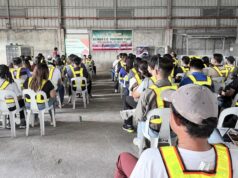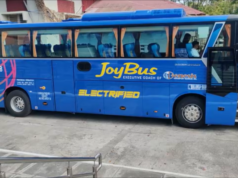CLARK FREEPORT – Saying that the increasing tax burden will result in capital flight that would be detrimental to the economy, the Clark Investors and Locators Association (CILA) on Wednesday aired their concerns on the impending Tax Reform for Acceleration and Inclusion (TRAIN) 2 Law.
CILA president Dr. Francisco Villanueva said in a presentation that “reality bites, TRAIN 2 is not just a 15 percent corporate income tax (CIT) but also adds local taxes that is 11 percent of net income for a total of 26 percent CIT.”
Guest speaker, Dr. Enrico L. Basilio, assistant professor of the University of the Philippines Diliman National College of Administration and Governance, explained further during the forum that the 15 percent proposed CIT is equal to five percent gross income earned (GIE) in addition to local taxes.
Helping explain the effective CIT rate including the local taxes is Professor Leandro Tan, economist of the University of Asia and the Pacifi c. Villanueva said the government might end up collecting less because a lot of manufacturers in this freeport “have a principal company they are manufacturing for and all they have to do is play around with the transfer price and they can declare a non-profi t.”
He said, “the GIE regimen is more advantageous because it is based on growth. It’s simple collection. So, it’s very easy. It is like a VAT system.” Villanueva said efficiency is superlative.
“It’s easier but when you go into the CIT, it becomes complicated while the manufacturers have the option of changing the transfer price,” he said.
Villanueva cited as example on how the government lost the excise on cigarettes.
“All they have to do – the cigarette companies – they came up with a transfer price that is ridiculously low that’s why there’s nothing to tax,” he said.
The taxable income that has to be declared by locators is the GIE, he said.
However, Villanueva said CILA supports the objectives of the TRAIN which is tax reform, economic acceleration and development as well as inclusiveness.
He said these initiatives addresses one of the most problematic factors of doing business in the Philippines.
According to the World Economic Forum (WEF) the inefficient government bureaucracy, lack of infrastructure and tax regulations are among the major concerns.
Laggard
“We have been the laggard for foreign direct investments (FDI) as we take a look at the ASEAN, we only have four percent of the pie for the past six years as compared to Singapore which has 52, Indonesia 16, Thailand seven percent, Malaysia 10, Vietnam eight percent… we are only half of Vietnam,” Villanueva lamented.
“We realize that the government needs money to support the Build, Build, Build program, that’s a reality and we support the administration’s stand to create more jobs for inclusiveness,” he said.
But for the past few years we have been noted for our non-inclusive growth – the economy has been growing but employment has not been improving, he pointed out.
“To address these issues, it’s not right to kill the Golden Goose that lays the golden eggs and maybe that’s where we are headed right now,” he bewailed.
Villanueva said if you take a look at our competitiveness, we are already below.
“In terms of minimum wage, we are higher, power rates we are higher, infrastructure and CIT we have the highest CIT,” he said.
“We are bringing CIT down that’s good but everybody else is at 15 to 20 percent.”
Villanueva said CILA believes the government needs to raise more money and to get more employment by decreasing the tax burden. He said locators of economic zones are noted for their integrity in their taxes since they are monitored closely and pay all their taxes well.
Villanueva said the increasing tax burden will result in capital flight. “A lot of our big locators can already move certain expansions programs abroad like China or Vietnam which will result in unemployment, less corporate core demand and undone infrastructure,” he said. “That is not the way.”
The Department of Finance (DOF) has been telling everybody that the government spent P300 billion in 2015 for locators.
Fiction
“This is a fiction,” Villanueva said. “First of all, above P200 billion of that is from VAT.”
There is P86 billion income tax incentive management and transparency act (TIMTA).
“So, you could apply the 25 percent or 30 CIT rate on the GIE, you are overstating your revenue under the CIT regime,” he noted.
“One of our locators here has shown us the figures that the revenue lost due to TIMTA is 1,600 percent overstated so this P86 billion is fiction,” he said.
“The elephant in the room is not the incentives, it’s the revenue productivity. We are not collecting a lot,” Villanueva said.
“It’s not the tax perks that count, it’s the collection efficiency.” He said Thailand’s CIT is 20 percent but they are way up there in productivity at 31, Singapore has 17 and yet their collectivity is 21 as compared to only 12 for the Philippines.
Villanueva said what CILA is proposing is to have more FDI: “The more FDI we get, the more employment we have, the more export we have, and the more tax revenue we shall get.”.
Villanueva said study shows that economic zones account for 84 percent for FDI, 87 percent of export and 1.87 million of jobs.
“So instead of the target 25 percent CIT, which is the highest from all our neighbors, why don’t we go 20 percent and why don’t we do it right now,” he proposed in order to attract more investments.
“The policy they have and the principles for granting tax incentives which are performance based, targeted, time bound, transparent are all good but they forget the most important criteria of all – it must be competitive,” Villanueva said.
“All our neighbors are constantly realigning their incentives to be more competitive in the ASEAN region,” he noted.
Villanueva said our neighbors have income tax holidays of 10 to 15 years.
“We should have at least 10 years because the four years tax holiday we have does not count because a lot of big companies are not making money for the first four years so what’s the use of the income tax holiday if you are not making money?” he asked.
Villanueva said what is more important is the net operating loss carry over.
“When it comes to expansion, we have to adhere to the Department of Trade and Industry and the Board of Investments concept that every time you have a new project it is treated as a separate incentive package,” he said, noting that there should also be instability of policy and good sunset provisions for companies that deserve it.




